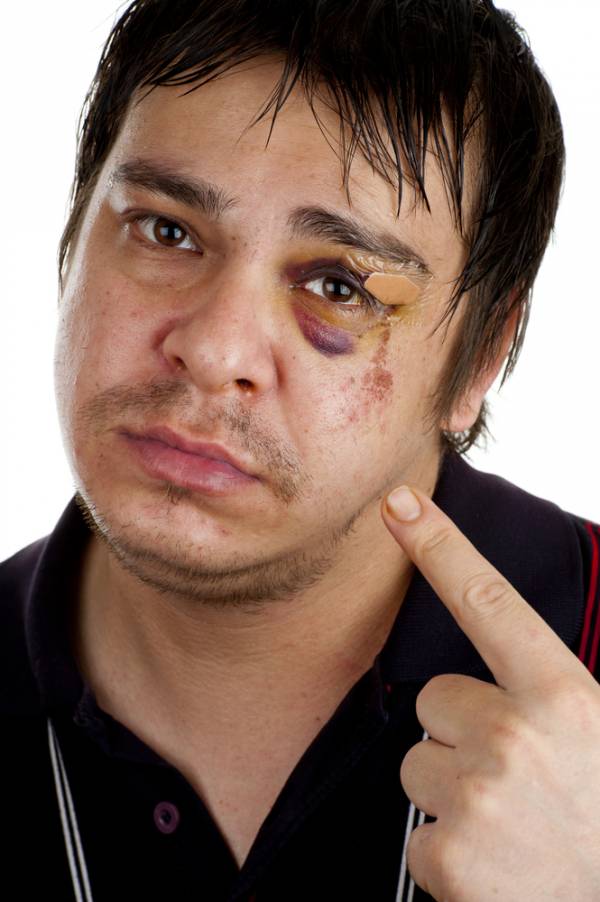Brazilian jiu-jitsu is a martial art; it contains elements of combat and self defense. Most people practice it in a sport context, but at its heart, it is about protecting yourself and, if necessary, doing injury to another person before that person can injure you. Of course, particularly in sport jiu-jitsu we all play by rules designed to keep us safe from bodily harm; we tap before our partner hurts us, we keep in mind the size and strength of our training partners relative to ourselves, and we learn when it’s appropriate to go smashmouth and when to dial it back a little. (And if we don’t do these things, we should start. Pronto.)
Of course, even with these safeguards in place, people still get hurt. And unfortunately, sometimes we ourselves are the reason. We might crossface too hard and tweak someone’s neck, or lose our balance and land with the pointy part of our elbow in our partner’s ribcage. There are endless ways we can accidentally cause another person pain or injury. I myself have been on the receiving end of countless black eyes, shoulder tweaks, and even toenail scratches (yuck).
I have also hurt people in the past, and, sadly, I know I’m not done with that aspect of training, no matter how careful I try to be. None of us is. It comes with the territory. But as with most aspects of jiu-jitsu, there are things you can do to maximize the potential for growth, learning, and prevention.
So, if and when you hurt someone while training, here are a few things to keep in mind, assuming it was an accident:
1. Apologize – a few times. Mean it. And then stop.
Don’t put the injured person in the position of having to make YOU feel better. You’re the one who did the hurting, even though you didn’t mean to. It’s not fair for you to keen and wail and gnash your teeth because you “feel so bad.” You have to bear that burden. It’s kind of like when the relationship experts say that if you cheat on your spouse and are planning NEVER to do it again, you shouldn’t say anything. Telling makes your spouse feel lousy and suspicious, and it doesn’t accomplish anything more than making you feel like you were able to unload your burden onto someone who doesn’t deserve to have to carry it. You don’t get to feel better at another person’s expense.
2. Listen to your gut.
 Sometimes we will train when we are nursing an injury or are tired. These are primo times for accidents to occur, because that’s when we are sloppy. Watch for this tendency in yourself and in others. Particularly if you are a higher belt, watch for that glassy-eyed stare that means your partner has reached his/her limit but doesn’t want to say so. In this case, strongly encourage the person to rest for a round, but if you cannot convince the person, go very lightly. If YOU are the person who needs to sit out, sit out.
Sometimes we will train when we are nursing an injury or are tired. These are primo times for accidents to occur, because that’s when we are sloppy. Watch for this tendency in yourself and in others. Particularly if you are a higher belt, watch for that glassy-eyed stare that means your partner has reached his/her limit but doesn’t want to say so. In this case, strongly encourage the person to rest for a round, but if you cannot convince the person, go very lightly. If YOU are the person who needs to sit out, sit out.
3. Take an inventory of the things you can do to minimize risk, and do them.
Separate your ego from your game. Train hard, but not like an a**hole. Breathe deeply and slowly. Relax – all the muscles in your body. Decide you want to protect yourself and your training partner, and this is more important than “winning” the round. Monitor your proximity to other people on the mat, particularly if you see a head and a foot coming dangerously close to one another. None of these things will guarantee you don’t injure someone or get injured yourself, but they may reduce the likelihood.
I doubt I know a single grappler who isn’t nursing some kind of strain or ache, and many people have worse injuries; they’re waiting on surgery, taping and icing, favoring and compensating because something hurts. They continue to train anyway. Getting injured is part of the deal. Injuring people is also part of the deal. I hope nobody injures another person or gets injured ever again, but since this is highly unlikely, give some thought to how you might handle it if you do end up being responsible for the injury of another person.
How would you handle it? How have you handled it in the past?
Post your thoughts to comments.






